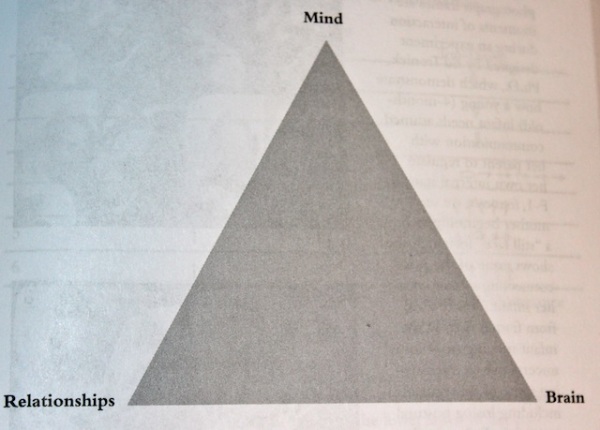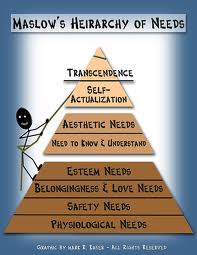In a new field call the Interpersonal Neurobiology, the mind, brain and relationships is viewed as a single reality rather than three separate entities. First let me quickly review the single reality story and then I will look at the value or benefits of this new view.
To understand how mind, brain and relationships are connected as a single reality we can envision a visual image of triangle that signifies one reality with three facets. The one unified reality, represented by the triangle, is the system of energy and information flow (at times I will refer to it as ‘the flow’).
The triangle represents the process by which energy and information flow and how the flow changes across time. The relationships are the sharing of that flow. The brain here represents the neurones in the head, as well as the nerves in the whole body; and it represents embodied mechanism of that flow. And the mind is an emergent process the arises from the system of energy and information flow within our bodies and between people; another wards the mind result from the brain and the relationships as the energy flow. The mind is an emergent process that regulates that from which it arises.( i.e. the mind arises from the movement of energy in the brain and the relationships; and then the mind regulates the flow in the brain and in a relationship). What arises is the emergent self – organizing process that regulates the energy and information flow. So the mind, among other attributes, is in part the regulatory process that shapes energy and information flow within and between people
In the Interpersonal Neurobiology field, the brain, mind and the relationships are not separate from each other, they are three elements of energy and information flow that represents the same single reality. These three elements communicate, relate and exchange information with regulation of “the flow” between them. The better the communication and linkage between them then better will be the “integration”, which is important as we will see in a moment.
From an interpersonal neurobiology perspective , integration is the definition of good health. Integration is, as mentioned before, the linkage of differentiated elements. A healthy mind, a healthy brain, and healthy relationship emerge from good integration. The structural connections of differentiated areas to one another in the body enable flexible and adaptive regulation. A well-regulated brain coordinates and balances its functioning through having a good integration with all its differentiated parts.
What are the advantages of this model ? Well, for one, we can understand better how the energy and information flow trough the brian as revealed in various brain scan findings; for example we can see what happens to energy flow on a scan when someone sees a loved one or an enemy or what happens when we trying to solve a problem etc. We can also reinterpret the field of mental disorders; instead of listing properties of a particular disorder and giving it a name such a depression or schizophrenia, we can understand depression or schizophrenia as process of energy flow disruption or inadequate integration between differentiated parts of the brain . We can also reframe how we approach understanding relational experiences within families, couples, classrooms, or companies. Integration becomes the framework for looking for dysfunction ; the energy and information flow becomes our focus for correcting the dysfunction.
Integration creates harmony. Impaired integration results in chaos and/or rigidity. Brain or relationship that are not integrated move into dysfunctional state. The brain is unable to balance the flow of energy and information in a flexible way. So it either adopt a very rigid way of handling the energy or it may become very chaotic. The same is true for the relationships, if the information and energy cannot be handled between a couple in flexible and balance manner the relationships become rigid or chaotic.
The natural implication of this interpersonal neurobiology view of integration at the heart of health is that we can empower each other to discover novel and effective approaches to promoting wellness in our relationship, our brains, and our minds.
The nature of the impediment to integration may be some combination of genetic , experiential , or chance factors. This strategy then recognizes each individuals innate potential to heal and become whole by releasing the blocked capacity of that person to integrate the brain and relationships. The role of the clinician , teacher , or parent , then , is to facilitate the discovery of this potential for integration inherent in each of us. This is the way we awaken the mind to create health in the person’s life.
Daniel J. Siegel writes in his book ” Pocket Guide to Interpersonal Neurobiology” ...
“…the triangle in everyday life enables us to see how our minds emerges not only from neural mechanisms but also from relationship we have with other people and with our planet. This means that we don’t ” own ” our minds , but rather we have an expanded sense of identity that goes beyond the boundary of our skin , beyond a definition of ” self” that is limited to just our bodily encasement. When studies of happiness, health, longevity , and even wisdom are reviewed , the key feature shared by each of these attributes is relationships. We can see how the triangle makes relationships equally as important as the embodied mechanisms of the brain in shaping the mind.When the relationships are integrated, a person’s mind thrives and the individual is healthier, happier, wiser, and live longer.”
At the heart of well-being is a fully integrated view of energy and information flow: the way it is shared in relationships, passes through the embodied mechanism of the brain, and is regulated by the self-organizing emergent embodied and relational process of mind.
Daniel J. Siegel ” Pocket Guide to Interpersonal Neurobiology”
Related articles
- Mindfulness is the single most important foundation of Health. (drchana.com)
- Living In Accordance With The Dao or Healing By Aligning With The Universe. (drchana.com)
- Acupuncture (drchana.com)
- Interpersonal neurobiology: Great slate of speakers next month at UCLA (westallen.typepad.com)







































